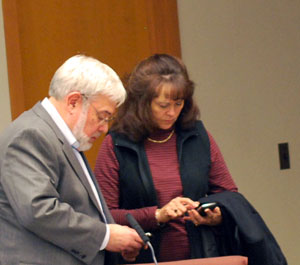AATA Extends Countywide Planning Time
Ann Arbor Transportation Authority board meeting (Nov. 18, 2010): Starting things off on Thursday – an hour earlier than the board’s usual 6:30 p.m. start time – was an update from the consultant and AATA staff who are leading the community in developing a countywide transportation master plan (TMP).

Board members Jesse Bernstein and Sue McCormick confer before the start of the Nov. 18 meeting. (Photos by the writer.)
The steps outlined for developing the TMP include a chronology for identifying the following: a shared community vision; a transit needs assessment; transit options; a set of scenarios. The consulting team is in the midst of a phase that identifies a range of various options. The creation of various scenarios – combinations of different transit options – will constitute the final phase of work before production of the TMP in mid-April 2011.
That projected completion date reflects an extension of the original timeframe, which was originally set to conclude in late February. The extra time will allow for an additional step in the process – a step that will allow the consultant to present a set of scenarios without specifying any one of them as the recommended scenario.
To allow for the extra time, later in the evening the board approved a resolution increasing the $399,805 contract with Steer Davies Gleeve – the consultant AATA hired to help with the work – by an amount not to exceed $32,500.
In other business, the board discussed, but did not approve, a new janitorial contract for Blake Transit Center, which specified a different vendor from the current one. The new vendor’s bid came in at a cost a bit more than half of what had been budgeted for the year: $72,000 compared to the budgeted $126,069. Concerns by board members about how the cost savings were being achieved were serious enough that they chose, on a split vote, to table the issue.
In a move that did not authorize any current expenditure, the board adopted a compensation philosophy over which there was some brief but firm debate. Board member David Nacht weighed in against the idea of a public entity creating such a document – they’re only used to justify increases in payment but never decreases, he said. Expressing the view of the majority, however, was board member Sue McCormick, who stressed the importance of a public entity making a clear and transparent statement of how salaries are set.
The board entertained its usual range of committee reports and remarks from the public. [Full Story]



